When Not to Use AI: Critical Cases Where Human Judgment Must Prevail
 How Small Businesses Are Replacing Expensive Agencies with AI Video Generators How Small Businesses Are Replacing Expensive Agencies with AI Video Generators |
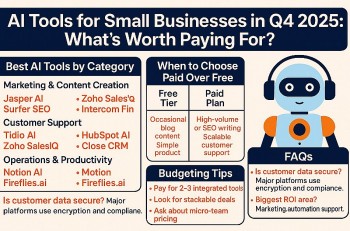 AI Tools for Small Businesses in Q4 2025: What’s Worth Paying For? AI Tools for Small Businesses in Q4 2025: What’s Worth Paying For? |
Just Because You Can Use AI Doesn’t Mean You Should
Artificial intelligence is revolutionizing how we live and work. From automating customer support to generating content and analyzing massive datasets, AI offers speed, efficiency, and innovation. However, its rising influence has also raised urgent ethical, legal, and social concerns.
When used irresponsibly or without nuance, AI can erode trust, perpetuate bias, and make decisions with life-altering consequences. As AI becomes more accessible and integrated into everyday systems, it’s crucial to understand not just where AI excels, but where it absolutely must not be used.
Below, we explore high-stakes domains where AI is either dangerous, ethically questionable, or insufficient—and where human insight remains indispensable.
Read more: How to Use AI Effectively Without Losing Our Humanity
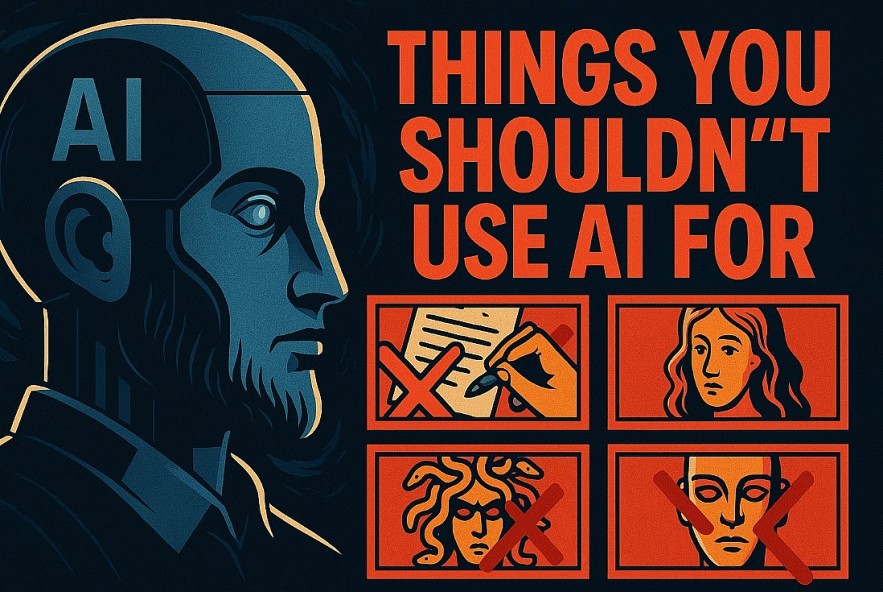 |
| When Not to Use AI |
1. Tasks Requiring Empathy, Compassion, and Emotional Intelligence
AI can mimic tone and language, but it cannot feel. In emotionally charged situations—like grief counseling, trauma support, or end-of-life care—empathy is non-negotiable.
AI lacks the capacity to respond intuitively to emotional nuance, body language, or cultural subtleties. Delegating these roles to machines risks dehumanizing sensitive interactions.
Avoid AI in:
-
Crisis hotlines
-
Therapy sessions
-
Conflict mediation
-
Social work and caregiving
Why human judgment matters: Emotional intelligence isn’t programmable. People need to feel heard, seen, and understood by another human—not a chatbot.
2. High-Stakes Legal and Medical Decision-Making
While AI can assist doctors and lawyers by surfacing relevant data or flagging anomalies, it cannot account for complex judgment, ethical dilemmas, or the full context of a case.
In healthcare, an AI diagnosis based on incomplete or biased data can lead to fatal errors. In law, automated risk assessments or sentencing tools can deepen systemic injustice.
Avoid AI in:
-
Final medical diagnoses or prescriptions
-
Legal sentencing or parole decisions
-
Immigration status evaluations
-
Child custody or family court rulings
Why human judgment matters: These decisions require professional accountability, a deep understanding of nuance, and ethical deliberation that no algorithm can replicate.
3. Ethical or Moral Judgment Calls
AI does not possess a moral compass. It calculates probabilities—not consequences. It is inherently unequipped to navigate moral gray areas, societal values, or justice.
Ethical decisions in hiring, firing, policing, or military targeting cannot and should not be automated without rigorous human oversight.
Avoid AI in:
-
Autonomous weapons and military targeting
-
Hiring and firing without review
-
Predictive policing and surveillance
Why human judgment matters: Morality requires lived experience, social context, and accountability—elements no dataset can capture.
4. Creative Work That Requires Authenticity and Lived Experience
AI can remix, rewrite, and regenerate—but it doesn’t create in the human sense. True creativity is rooted in emotion, struggle, imagination, and human perspective.
While AI tools can aid in ideation or design, they should not replace authentic storytelling, original art, or cultural expression.
Avoid AI in:
-
Memoirs, poetry, and personal narratives
-
Fine art or emotionally-driven film/music
-
Journalism or investigative reporting
Why human judgment matters: Culture is not code. Creative work carries emotional depth, cultural context, and moral responsibility that AI cannot replicate.
5. Applications Involving Privacy, Consent, and Civil Liberties
Many AI systems are fueled by vast amounts of personal data. But using AI in areas like surveillance, behavioral prediction, or facial recognition—especially without consent—crosses ethical lines.
AI can profile, track, and categorize individuals in ways that violate privacy, exacerbate discrimination, and fuel authoritarian control.
Avoid AI in:
-
School surveillance or behavior scoring
-
Emotion detection in hiring
-
Facial recognition without consent
-
Monitoring employees’ private behavior
Why human judgment matters: Transparency, consent, and privacy are foundational rights. AI systems often operate opaquely, making abuses harder to detect.
6. Situations Affecting Human Rights, Freedom, or Access to Essential Services
Automated decisions in areas like credit scoring, housing, immigration, or social services can entrench inequality and deny basic human rights.
Bias in AI systems—whether from flawed data or biased design—can disproportionately affect marginalized groups.
Avoid AI in:
-
Determining access to loans or insurance
-
Border control or asylum applications
-
Predictive modeling for welfare eligibility
-
Education placement or discipline systems
Why human judgment matters: People’s lives and futures should never be determined solely by opaque algorithms.
Conclusion: Know the Limits. Lead with Humanity.
AI is here to stay, but its role must be clearly defined and ethically managed. In high-stakes or deeply human domains, delegating decisions to algorithms is not only risky—it’s irresponsible.
The question is not whether AI can replace humans. The question is whether it should.
Understanding the limits of AI is what separates blind adoption from responsible innovation. In a world increasingly shaped by code, our humanity must remain the final decision-maker.
 Top 10 Best Free AI Tools for Excel to Work Smarter in 2025 Top 10 Best Free AI Tools for Excel to Work Smarter in 2025 This article reviews and ranks the top 10 best free AI tools for Excel in 2025, analyzing their features, pros, cons, and suitability for different ... |
 The Global State of AI in April, 2025: Tools, Models, and Policies Reshaping the Future The Global State of AI in April, 2025: Tools, Models, and Policies Reshaping the Future As of April 2025, artificial intelligence (AI) is evolving faster than ever—spanning powerful new models, ambitious policy shifts, and strategic global investments. |
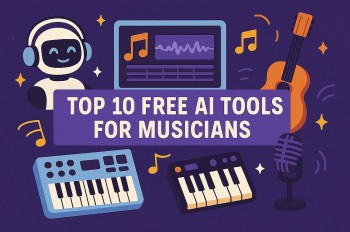 Top 10 Best Free AI Tools for Musicians in 2025 Top 10 Best Free AI Tools for Musicians in 2025 Discover the top 10 free AI tools for musicians in 2025, from song generators to AI mastering. This expert-reviewed list helps artists create, produce, and ... |
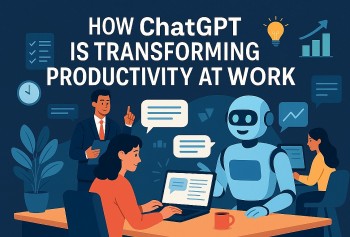 How ChatGPT Is Transforming Productivity at Work How ChatGPT Is Transforming Productivity at Work In an era where efficiency defines success, professionals are turning to tools that help them do more with less. ChatGPT is one of those tools—an ... |
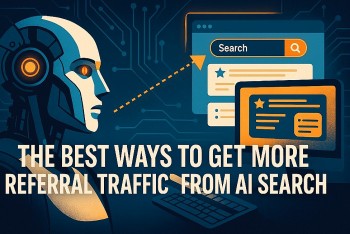 The Best Ways to Get More Referral Traffic from AI Search The Best Ways to Get More Referral Traffic from AI Search Discover how to attract high-quality traffic from AI platforms like ChatGPT and Perplexity. This 2025 guide reveals actionable strategies to boost citations, optimize content, and ... |























